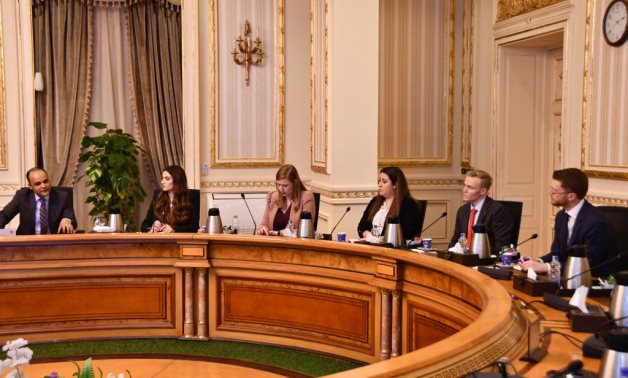
U.S. Congressional Assistants Delegation at Egypt's Cabinet's headquarters in Cairo. December 16, 2021. Press Photo
CAIRO – 16 December 2021: Spokesperson of the Cabinet Nader Saad answered Thursday the questions raised by members of the U.S. Congressional Assistants Delegation who is on a visit to Egypt.
One question was on the source of funding of Decent Life initiative worth LE700 billion and targeted at 58 million villagers. Saad answered that Egypt has embarked on an economic reform program that consists of gradually eliminating energy subsidies among others, which has secured funding for different developmental projects.

Another question was on the role of the private sector in the initiative so the Cabinet's spokesperson highlighted that all works are implemented by private contractors as the government's role is confined to funding and supervision.
The issue of overpopulation was also brought up by the delegation, which is composed of 12 Democrat and Republican members. The answer was that the government is preparing a program that would grant incentives to low-income families committed to having only two children. That is in addition to awareness campaigns aimed at raising awareness on the problem.
The initiative – which began earlier in 2021 and will conclude in 2024 - is taking place in 4,500 villages.
The goals of the initiative are as follows:
Rehabilitating houses, building ceilings for houses that lack them, and building residential communities in villages in need.
Connecting the houses to water supply, wastewater, natural gas, and electricity networks.
Introducing infrastructure necessary for micro enterprises.
Providing medical services, building hospitals and healthcare units, and equipping them with the necessary devices and medical staff.
Operating medical caravans, and offering prosthetics.
Improving the quality of schools, and nurseries, and establishing literacy classrooms.
Expanding economic empowerment, vocational training, and employment through micro, small, and medium enterprises.
Establishing industrial, and craft complexes.
Bolstering food supply chains, and providing subsidized food.
Comments
Leave a Comment